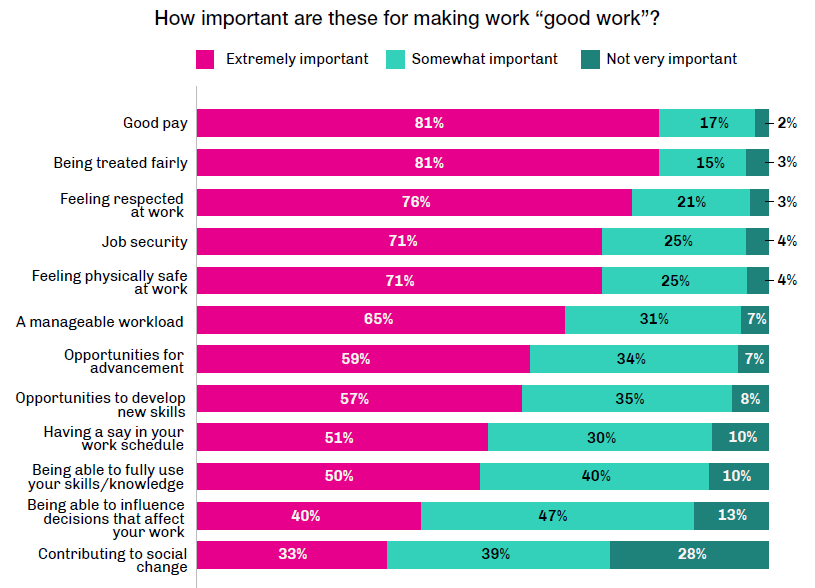Good Work during Youth Contributes to Future Employment Success
Good Work during Youth Contributes to Future Employment Success – and Collective Economic and Social Health
During the early working years, being employed and the quality of employment contribute significantly to lifelong employment success. When youth experience good work, everyone benefits through collective economic and social health (1). Yet, more youth are employed in poor-quality jobs than any other age group.
For the French version of this post, please click here. | Pour la version française de cet article, veuillez cliquer ici.
Low Employment/High Unemployment Rates in 2025
Youth constitute a large segment of the workforce. In 2024, over 8.1 million people in Canada—one quarter of the workforce—were between 15 and 29 years old (2).
In July 2025, the employment rate for youth 15 to 24 fell to 53.6%, the lowest since November 1998 (excluding 2020 and 2021) (3). The unemployment rate for youth was 14.6%, the highest since 2010 (excluding 2020 and 2021) (3). Youth who experience disability and who have intersecting identities, particularly Indigenous and Black youth and recent immigrants, face additional employment barriers.
Many Young Workers Have Negative Work Experiences
A study by the Future Skills Centre found that young workers commonly experience negative work qualities, including age discrimination, lack of respect, and unfair treatment from managers and supervisors. Some young workers simply accepted that work is unrewarding and un-affirming (5).
When unemployment is high, finding a new job can be daunting. Even so, 45% of young people reported quitting a job because of bad working conditions. Young people who had a disability or were Indigenous or racialized were more likely than others to quit (5).
Youth Employment Survey
Basis of Discrimination at Work
Age 52%
Sex or gender identity 38%
Race or ethnicity 34%
Sexual orientation 12%
Immigration status 12%
Language skills/accent 10%
Disability status 10%
45% quit a job due to bad work conditions, of which:
65% had a disability
66% were Indigenous
50% were racialized
17% work at more than one job
Most due to low wages
Source: Future Skills Centre – Work Quality Experiences and Engagement among Young Workers (2024)
What Is “Good Work”?
How do young workers define “good work”? A workplace with “good work” relies on some of the key features of an inclusive, accessible workplace culture: fair and competitive pay, a safe and welcoming environment for all workers, and regular communication with workers about what they need to perform their job and to advance in their career.

Source: Future Skills Centre – Work Quality Experiences and Engagement among Young Workers (2024)
Text in diagram: How important are these for making work “good work”?
Good pay – 81% extremely important, 17% somewhat important, 2% not very important.
Being treated fairly – 81%, 15%, 3%.
Feeling respected at work – 76%, 21%, 3%.
Job security – 71%, 25%, 4%.
Feeling physically safe at work – 71%, 25%, 4%.
A manageable workload – 65%, 31%, 7%.
Opportunities for advancement – 59%, 34%, 7%.
Opportunities to develop new skills – 57%, 35%, 8%.
Having a say in your work schedule – 51%, 30%, 10%.
Being able to fully use your skills/knowledge – 50%, 40%, 10%.
Being able to influence decisions that affect your work – 40%, 47%, 13%.
Contributing to social change – 33%, 39%, 28%.
Gen Z Values and Strengths
In 2025, Generation Z (Gen Z) youth are 13 to 28 years old. Many Gen Zers care about organizations’ commitment to sustainability, climate change, and social issues, like equity and diversity. And actions speak louder than words — they will hold organizations accountable, while seeking transparency and authenticity.
Gen Zers grew up in a world that is changing rapidly, both technologically and socially. Constant change has made them flexible, resilient, and innovative, and they expect careers that evolve with the times. Work-life balance and mental health are important, and many may prefer hybrid workplaces.
The online world has made Gen Zers well versed in online interactions, collaboration, and community decision-making. They want to understand the “why” behind decisions — and are not afraid to ask. (6, 7)
Building an Inclusive Workplace for Gen Z
Gen Zers are your present and future workforce, business partners, and suppliers. Build a welcoming work environment for Gen Z workers, including workers experiencing disability and with intersecting identities, with the following practices.
Leadership Training
One of the most recurring complaints in the Future Skills Centre survey was bad and often abusive managers and supervisors. Ensure leadership is trained in management, interpersonal, and team building skills and workplace inclusion. Create a safe environment for leadership and workers to openly discuss issues.
Mentoring
Mentoring can help young workers transition into the workplace. It offers positive outcomes related to mental health and employment. Young workers experiencing disability and who have intersecting identities benefit from mentors who share similar lived experiences.
- Access The Mentoring Effect: Youth Experiencing Disabilities on the Mentor Canada website.
- Sign up for MentorAbility, which facilitates fully supported short-term (one hour to one day) mentoring opportunities for persons experiencing disability.
Engage in Regular Conversations
Do more listening than talking. When possible, have conversations in person to help workers practice face-to-face communication. Respectful conversations can strengthen relationships and build trust and confidence.

(Photo Credit: Francis Odeyemi – Unsplash)
- What impact do they want to make in their workplace and community? Which of their strengths can help them achieve it?
- Do they have everything they need to do their job? What are the challenges?
Offer Structure — and Flexibility
Set goals and expectations to provide focus and a road map. Invite their input.
Help young employees develop a routine, especially if they have been working remotely and have not had opportunities to observe experienced colleagues. Offer the option to job shadow for a day.
Be Open to Questions
Many young employees are curious and enthusiastic. They often have many questions and might be eager to share information.
Make time to answer questions. Stay open to suggestions and explain your reasoning when needed. These conversations can go a long way to building trust and to demonstrating to young workers that they are valuable contributors in your workplace.
Invest Today for Future Success
When young workers feel that their contributions matter, they are encouraged to stay in their job. When they leave, they bring more confidence, more self-awareness, and more soft skills to their next stop.
If they have a good experience, they may decide to return to your workplace to fill higher-level positions or to support your business as a customer or supplier. A little time invested today can create good work for young workers and more future success for workers and employers.
References
- OECD. Youth – Key Messages – Investing in youth employment and social policies is key to the future of our societies. Accessed July 18, 2025.
- Statistics Canada. Population estimates on July 1, by age and gender. Released September 25, 2024. Accessed July 18, 2025.
- Statistics Canada. Labour Force Survey, July 2025. Released August 8, 2025. Accessed August 13, 2025.
- Future Skills Centre – Toronto Metropolitan University. Work quality experiences and engagement among young workers. (Research report) May 2024.
- Stanford University. 8 ways Gen Z will change the workforce. Stanford Report. February 14, 2024. Accessed July 22, 2025.
- Deloitte. Understanding Generation Z in the workplace. Accessed July 22, 2025.

